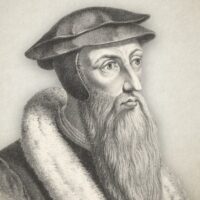
Book 2: The Argument, Of The Knowledge Of God The Redeemer, In Christ, As First Manifested To The Fathers, Under The Law, And Thereafter To Us Under The Gospel
The First Part of the Apostles’ Creed—viz. the knowledge of God the Creator, being disposed of, we now come to the Second Part, which relates to the knowledge of God as a Redeemer in Christ. The subjects treated of accordingly are, first, the Occasion of Redemption—viz. Adam’s fall; and, secondly, Redemption itself. The first five chapters are devoted to the former subject, and the remainder to the latter.
Under the Occasion of Redemption, the Fall is considered not only in a general way, but also specially in its effects. Hence the first four chapters treat of original sin, free will, the corruption of human nature, and the operation of God in the heart. The fifth chapter contains a refutation of the arguments usually urged in support of free will.
The subject of redemption may be reduced to five particular heads:
I. The character of him in whom salvation for lost man must be sought, Chap. 6.
II. How he was manifested to the world, namely, in a twofold manner. First, under the Law.
Here the Decalogue is expounded, and some other points relating to the law discussed, Chap. 7 and 8. Secondly, under the Gospel. Here the resemblance and difference of the two dispensations are considered, Chap. 9, 10, 11.
III. What kind of person Christ was, and behaved to be, in order to perform the office of Mediator—viz. God and man in one person, Chap. 12, 13, 14.
IV. For what end he was sent into the world by the Father. Here Christ’s prophetical, kingly, and priestly offices are considered, Chap. 15.
V. In what way, or by what successive steps, Christ fulfilled the office of our Redeemer, Chap. 16. Here are considered his crucifixion, death, burial, descent to hell, resurrection, ascension to heaven, and seat at the right hand of the Father, together with the practical use of the whole doctrine. Chapter 17 contains an answer to the question, Whether Christ is properly said to have merited the grace of God for us.
John Calvin (1509-1564) was a French pastor, theologian, writer and leading reformer during the Protestant Reformation. His most popular works are his “Institutes Of The Christian Religion” and his commentaries on most books of the Bible. He set forth the absolute sovereignty of God in history and salvation, ascribing all glory to the One with Whom we have to do—the TriUne Jehovah. It is from the teachings of Calvin that the Presbyterian churches emerged. The label which bears his name (“Calvinism”) refers not to all of the teachings he espoused, but rather, to those teachings dealing with the salvation of sinners, otherwise known as the Five Points of Calvinism, or, the Doctrines of Grace.
John Calvin's Institutes Of The Christian Religion, Book 1 (Complete)
John Calvin's Institutes Of The Christian Religion, Book 2 (Complete)
John Calvin's Institutes Of The Christian Religion, Book 3




